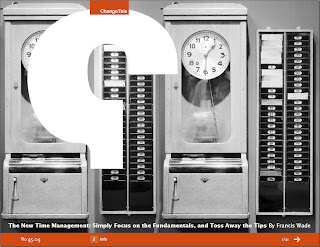 The following article was carried in the Sunday Gleaner today (with some edits) :
The following article was carried in the Sunday Gleaner today (with some edits) :
Here is the original article:
——————————————————————
It’s one of those issues that everyone complains about – “my Email Inbox has 500 items.” The retort draws a quick response — “Oh yeah, that’s nothing… mine has 5,000!”
Email explosion is one of the favourite things that Caribbean professionals across the region bemoan, but feel they can do little about. They suffer as they watch the size of their Inbox grow, and devote weekends, public holidays and even vacation days to getting rid of the monster. Once they do so, there is a feeling of relief as order returns to their tired psyches.
However, a month later it’s back.
Some try the trick of periodically copying all their messages to a bottomless folder, returning their Inbox to ground zero. Others simply delete everything, deciding that anything that’s in there is probably not valuable, and “if it’s really important, they can call.”
On the other side of each email, however, is someone who genuinely wants a response of some kind. The sender waits, while forming an unfavourable opinion of the person that has not replied. Cleaning shop by deleting emails en masse is risky business.
What can be done to address this problem that most will admit is not going away, and is likely to only get worse?
Face the Unproductive Facts
The first insight is the hardest to swallow: an overflowing Inbox is a sign of weak time management and productivity skills.
It’s not due to “those people” who won’t give us a break. It’s not that we are “bad at email.” It’s also not God’s fault for refusing to give us more hours in the day.
Recent research by Framework Consulting shows that an overflowing Inbox is a sign that the user probably has not learned, and is definitely not using, the best time management practices. Their Inbox is only reflecting the results of the habits they are using.
The solution? It turns out that a complex set of skills must be mastered in order to produce the Holy Grail of professional productivity – a perpetually empty Inbox.
That is no trick. A perpetually empty Inbox is not one that is blocked from other users, and does not come from changing an email address, job, country or computer. Instead, it is one that involves the skilful handling of email as soon as it arrives.
How is this accomplished?
The 11 Fundamentals
An empty Inbox is not created overnight. Instead, it involves the steady application of a set of habits that must practised continuously, like a forward defensive stroke or a scale in C major.
Of the 11 fundamentals, we have found that 7 of them are critical to properly manage email. These seven practices comprise the core of all complete time management systems, and once they are each mastered to a high enough level, the empty inbox is a natural outcome. When any of them is missing, the result is Inbox overload.
Here are the 7 core practices essential to proper email management.
- Capturing: using the email Inbox for temporary storage only, and for quick emptying. Messages are downloaded from a server only upon request.
- Emptying: moving messages out of the Inbox to other folders as soon as it’s practical
- Tossing: permanently deleting emails that won’t be acted on
- Acting Now: taking immediate action on messages that require 5 minutes or less to be completed
- Storing: placing information from messages in different folders for future retrieval
- Scheduling: using messages to create appointments for solo or group work e.g. to block out time for an interview, or time to review a document
- Listing: taking information from messages and adding them to lists for later action e.g. a list of items to be covered in a meeting agenda
Perhaps the biggest change that most professionals can make immediately is turn off the ability of their email programme to download messages automatically. Instead, in order to “Capture” properly, they must manually download email at pre-appointed times, while disciplining themselves to rarely, if ever, check email at other times.
None of these practices are easy to implement, especially as they are simply not taught in schools. Most of us put together a time management system without guidance in time to pass our 11+ examinations, and we are stuck with our creations that were meant for an age when email wasn’t invented.
The advent of email, with its 24 hour demands, means that we must all “up our game.” Instead of relying on home-grown approaches that were incomplete and ill-informed, we as professionals must take the next step to deliberately design our own time management systems. Using the 7 core practices as building blocks is just a start. A perpetually empty Inbox is a powerful milestone to accomplish.
![]() Over at my time management blog, I have written a 5 part series in which I speak about the fact that Outlook was never designed as a time management software, but as an email manager.
Over at my time management blog, I have written a 5 part series in which I speak about the fact that Outlook was never designed as a time management software, but as an email manager.




